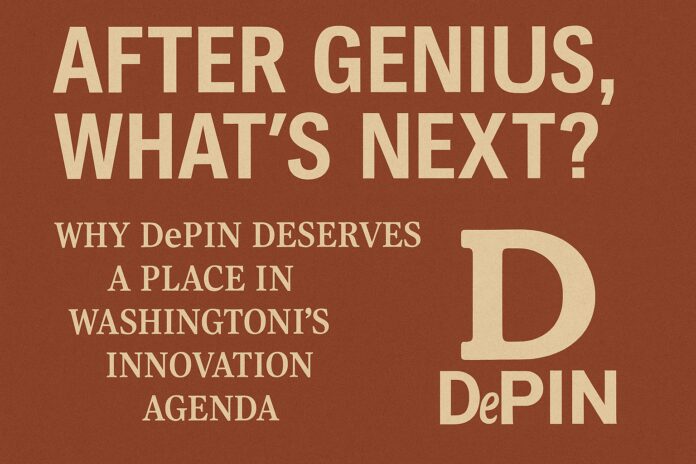The U.S. Congress just made a rare, forward-thinking move. With bipartisan support, the GENIUS Act (Government Evaluation of New Innovations and Using Science Act) passed the House this month — a promising signal that lawmakers are warming to the idea of embracing blockchain-based technologies. But while the act is a positive first step, it stops short of where the real action — and opportunity — lies: Decentralized Physical Infrastructure Networks, or DePIN.
What Is the GENIUS Act?
The GENIUS Act doesn’t propose sweeping reforms or new crypto regulations. Instead, it mandates that government agencies study and evaluate emerging technologies like blockchain, AI, and quantum computing — with a clear goal: to understand how these innovations could improve public sector operations.
It’s more about education than execution — but it’s notable nonetheless. Congress is waking up to the fact that Web3 isn’t just about meme coins and speculative trading. It’s about infrastructure, efficiency, and national competitiveness.
Enter DePIN: The Infrastructure Washington Isn’t Watching (Yet)
DePIN projects build real-world infrastructure — powered by tokens, not corporations. Think of decentralized alternatives to telecom towers, GPS systems, cloud storage, or mobility networks. These aren’t whitepapers. They’re live, permissionless systems with active user bases and real economic stakes.
Examples include:
- Helium (decentralized wireless)
- Render (distributed GPU compute)
- Filecoin and Arweave (decentralized data storage)
- Hivemapper (crowdsourced, token-incentivized mapping)
These projects are growing fast — and doing what traditional infrastructure can’t: building bottom-up, cost-effectively, and globally.
Why Should U.S. Policymakers Care?
- National security and resilience
Decentralized systems are less vulnerable to single points of failure, censorship, or foreign interference — exactly the kind of robustness the U.S. should be cultivating in its infrastructure. - Competitive advantage
While the U.S. drags its feet, China and the UAE are actively investing in tokenized infrastructure. If Washington wants to maintain tech leadership, DePIN deserves proactive support — not just retroactive regulation. - Public-private collaboration
These networks represent a new model for innovation: open-source, incentive-driven, and community-built. Instead of issuing billion-dollar contracts to the usual players, agencies could partner with DePIN protocols to achieve scalable, decentralized outcomes.
What Needs to Happen Next?
The GENIUS Act is a start. But real impact requires:
- Regulatory clarity for DePIN tokens
Many of these projects still operate in legal gray zones. A clear framework for utility tokens and protocol governance is essential. - Pilot programs and procurement trials
Federal agencies should test DePIN models for data storage, communication, or sensor networks — especially in underserved regions. - Congressional hearings dedicated to DePIN
Blockchain-based infrastructure deserves its own spotlight, not just a footnote under broader “emerging tech” discussions.
The Bottom Line
The GENIUS Act proves that Congress can act smartly on innovation when it wants to. But education without action is a missed opportunity.
DePIN isn’t theoretical. It’s operational. And if Washington wants to keep pace with the future of infrastructure, it shouldn’t wait for another committee to figure that out.




